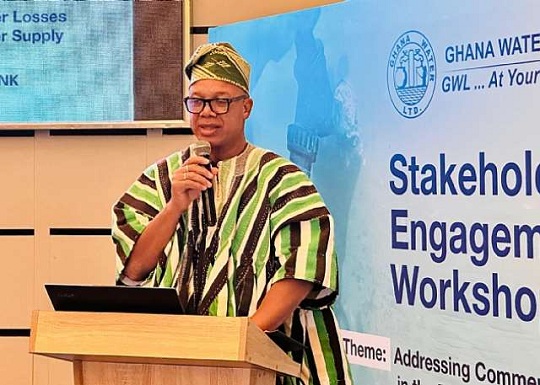The Ghana Water Limited (GWL) says it has uncovered commercial water losses valued at more than GH¢4.4 million in just six weeks of enforcement operations across Accra and Tema through its National Revenue Enhancement Teams (NRET)
Between August 11 and September 29, 2025, the NRET inspected customer accounts across districts in the Accra-Tema Metropolitan Area including Accra East, Kaneshie-Awudome, Weija, Baatsona, Tema Central, Dome, Darkuman-Gbawe, Sowutuom, and Odorkor.
The investigations uncovered 109 customers engaged in illegal practices, resulting in charges totalling GH¢4,409,017.81.
So far, 67 customers have paid GH¢760,631.71, with 24 of them clearing their debts in full and 43 making part payments, while 42 charged customers are yet to make payment commitments.
The most common infractions were meter bypasses, where consumers diverted water flow to avoid billing, and illegal connections from GWL mains.
Other cases involved meter tampering, manipulating devices to record lower consumption, and the use of in-line booster pumps, which deprived neighbouring households of regular flow.
This, the company said, has sparked the need for fresh measures to curb illegal practices undermining the company’s financial sustainability.
Mr. Adam Mutawakilu, Managing Director, GWL, speaking at a day’s stakeholder engagement workshop on commercial water losses in Accra on Monday, described the findings as a wake-up call on the urgent need to protect Ghana’s limited water resources from theft, inefficiency, and abuse.
The workshop brought together officials of the Ministry of Works and Housing, the World Bank, the Public Utilities Regulatory Commission (PURC), the State Interests and Governance Authority (SIGA), metropolitan and municipal assemblies, law enforcement agencies, customer representatives, and the media among others.
Commercial water losses not only affect revenue generation for service providers but also compromise equitable access to clean water for consumers significantly affecting Ghana’s urban water infrastructure.
The workshop, with support from the World Bank and the Greater Accra Metropolitan Area (GAMA) Project, provided a platform for open dialogue among stakeholders as part of a broader strategy aimed at shaping policy interventions and operational reforms that can curb these losses.
Mr. Mutawakilu explained that commercial water losses, driven by illegal connections, meter bypasses, tampering, and billing irregularities, remained one of the most pressing threats to the company’s financial stability.
“Every drop of water lost to theft is a drop denied to a community,” he stressed, adding that such losses not only deprived families of their basic needs but also undermined Ghana Water Ltd.’s efforts to ensure sustainable and equitable distribution of water.
Mr Mutawakilu said: “These practices not only rob GWL of revenue but also prevent us from expanding access, upgrading networks, and ensuring reliable supply for households, schools, and industries.”
Since assuming office in February 2025, the MD said he had been confronted with major liabilities, including electricity and chemical bills, high equipment procurement costs, and a growing wage bill, all worsened by low revenue mobilisation.
To address this, he launched the National Revenue Enhancement Teams (NRET) in July to identify and clamp down on illegal practices.
Mr. Mutawakilu emphasised that GWL could not tackle these losses alone and called for stronger collaboration with government, regulators, assemblies, law enforcement agencies, and customers to close enforcement gaps and promote responsible behaviour.
He assured participants that the workshop would not be “a mere talk shop” but would feed directly into GWL’s operational strategy with clear timelines.
The company, he pledged, would strengthen partnerships with law enforcement, improve transparency, and enforce anti-water theft measures.
Linking the initiative to broader national priorities, Mr. Mutawakilu reiterated GWL’s commitment to the Government’s “Water for All” agenda and the global Sustainable Development Goal 6, which calls for universal access to safe water.
He said addressing commercial losses was central to expanding coverage, reducing costs, and sustaining Ghana’s water supply systems in the long term.
“As we confront the combined pressures of climate change, population growth, and aging infrastructure, we must act decisively. Together, we can ensure that every drop of water produced by GWL reaches its rightful user, is accounted for, and contributes to national development,” the MD said.
Mr. Christopher Bofa, Marketing Manager at the GWL Head Office, explained that such illegal practices not only drained the company of critical revenue but also disrupted fair water distribution.
He added that the situation further undermined GWL’s mandate to provide reliable and equitable water supply, stressing that every cubic metre lost to theft reduced the company’s ability to expand services, maintain infrastructure, and respond promptly to genuine customer needs.
Mr. Bofa explained that, “These practices cause not only financial losses but also inequities in distribution, as some communities are denied access while a few benefit unfairly.”
Prof. Emmanuel Donkor, Chief Manager, Research and Data Analytics, who presented fresh data on water consumption in Accra East, revealed that 58 per cent of active billable customers consume between 20 and 60 cubic metres per month, placing them in the medium-use category that exerted steady demand on GWL systems.
At the lower end, 27 per cent consume less than 20 cubic metres monthly, equivalent to fewer than 20,000 litres of water, often reflecting restricted access or conservative use.
At the top end, 15 per cent consume more than 60 cubic metres, a category dominated by commercial and institutional users.
To contextualise these figures, Prof. Donkor explained that a typical household of four consumes about 1,000 litres, or one cubic metre, every two weeks.
This translates to more than 40 “Kufuor gallons” of 25 litres each per week, underscoring the extent of urban reliance on treated water.
“Accurate data allows GWL to design targeted solutions, whether in infrastructure planning, billing reforms, or customer education, to ensure water is available, affordable, and efficiently used,” he said.
GNA





